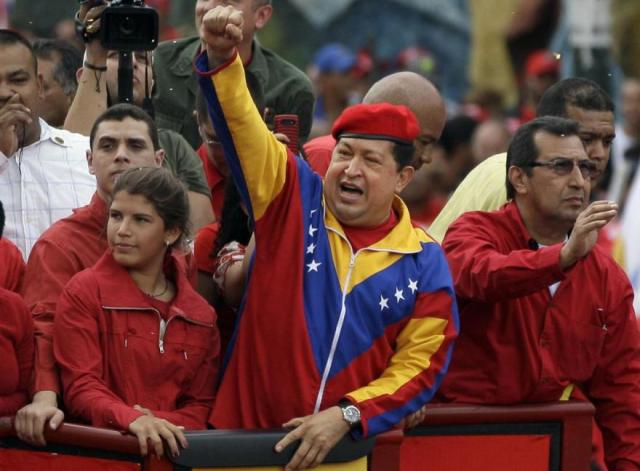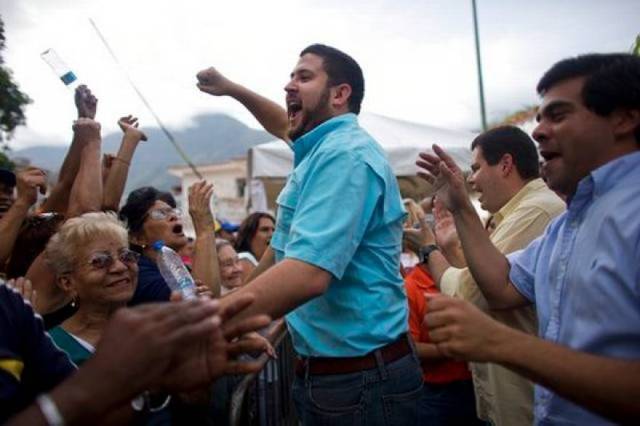
Some political experts say Florida’s efforts to usurp local government authority are uncomfortably reminiscent of the late strongman Hugo Chávez’s playbook.
By WLRN
Last week a Florida bill that would let the state override local authority in matters of public protests and police budgets was approved by a Senate committee after passing the full House last month.
But as the unusual — and, to critics, constitutionally unsettling — anti-crime legislation cruises through Florida’s Republican-controlled Legislature en route to GOP Gov. Ron DeSantis, who’s pledged to sign it, you might not expect it to make people think of Venezuela’s socialist-controlled regime.
Until, perhaps, you hear stories like David Smolansky’s.
In 2013, Smolansky was elected mayor of the Caracas borough of El Hatillo. He was a vocal opponent of Chavismo, the authoritarian socialist government founded by the late Venezuelan strongman Hugo Chávez.
Chávez died that year, but his regime remained in power — and that meant the local government Smolansky had just been elected to head was a big target for Chavismo sabotage.
“In those years of Chavismo, the main leaders against the regime came from local governments — that was the one space of resistance we had left,” Smolansky said.
“So that is why I was persecuted.”

That and because, despite being only 27 when he was elected, Smolansky was good at the job. Especially crime reduction — which was no small matter since Caracas as a whole has one of the world’s highest violent crime rates, and did at the time of Smolansky’s election.
From the start, the Chavista regime blocked Mayor Smolansky’s access to most of El Hatillo’s law enforcement budget. But even without that money, he created innovations like connecting residents and local police on social media — and his borough saw significant drops in major crimes like murder and kidnapping.
“We were able to have a municipality of zero homicides for a hundred days,” he said.
That accomplishment of course annoyed and embarrassed Chávez’s protégé and successor, President Nicolás Maduro, who is widely blamed today for the catastrophic collapse of Venezuela’s economy and public security.
“The regime went completely nuts,” Smolansky remembered, “because they knew people would see the difference between good governance and [their] bad governance.”
Not coincidentally, anti-regime protests were erupting across Venezuela at the time — and so to stamp out that inconveniently “good governance,” Maduro started ordering the arrests of opposition mayors like Smolansky who refused to stop the demonstrations.
In 2017, Smolansky escaped across the border into Brazil.
“I had to pass through 35 military checkpoints,” Smolansky said. “I shaved my beard, I used glasses” — and he wore a Catholic seminarian’s disguise he had ready in advance for just such a trip.
“I knew that my number was up,” said Smolansky, who today lives in Washington D.C. and is the Organization of American States’ envoy to the Venezuelan refugee crisis.
“I was prepared for that moment.”
“SHOULD ABSOLUTELY BE A WARNING”
But political experts who know Venezuela and U.S. state governments say something about that moment echoes at this moment in places like Florida.
They’re of course not suggesting Florida Gov. DeSantis and the Legislature in Tallahassee are a Venezuela-style dictatorship.
Even so, they find parallels in the increasing ways Florida is trying to weaken if not usurp the authority of local governments.
“I think Venezuela absolutely should be a warning for Americans about this sort of erosion of democratic rights,” said Jennifer McCoy, a political scientist at Georgia State University and a Venezuela expert.
In that regard, McCoy agrees it’s hard to ignore legislation like Florida’s HB1 — the anti-crime bill that passed the House in March and passed through the Senate Appropriations Committee last Friday, after hours of discussion.
The “anti-protest” bill, as it’s become known, lets the state override local law enforcement and prosecute anyone at a protest where someone else might damage property or commit violence. Meaning, if it becomes law, even peaceful protesters in Florida could be charged with a felony.
To continue reading click here.

